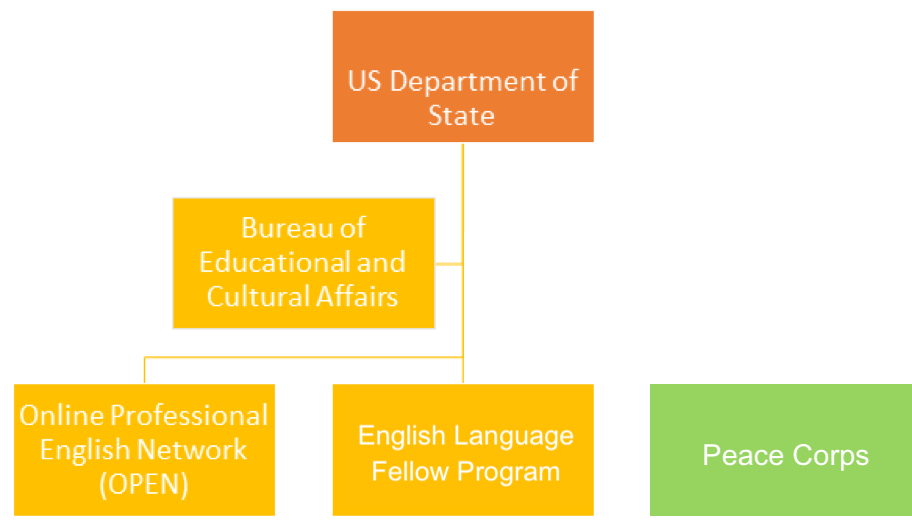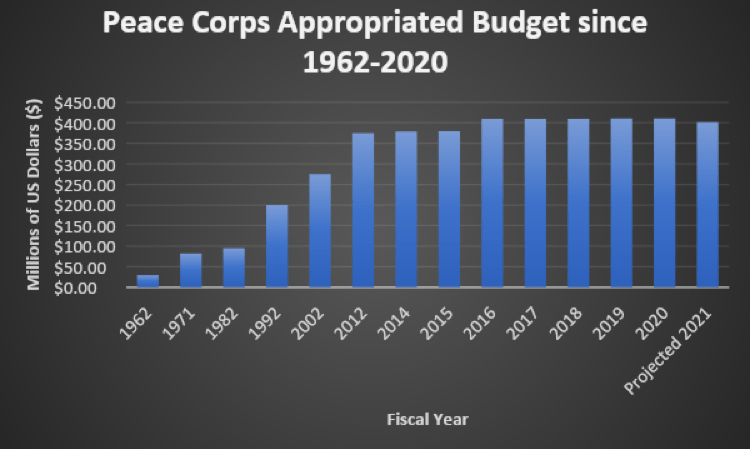In 2020, $730.7 million was distributed to educational and cultural exchange programs, which includes English language initiatives, according to the U.S. Department of State Fiscal Year 2020 Agency Financial Report.
The State Department oversees diplomatic relations with foreign nations. Underneath the general branch of the State Department is the Bureau of Educational and Cultural Affairs (ECA). Two major governmentally funded and administered English initiatives are overseen by the ECA: the Online Professional English Network (OPEN) and the English Language Fellow (EL Fellow) Program. The Peace Corps, an independent agency of the United States government, receives its annual budget by the congressional budget and appropriations process.
These three government English programs and other nonprofit organizations involved with TEFL/ TESOL carry out the ECA’s mission to promote mutual understanding between the US and other nations.
A U.S. State Department official commented on the significance of funding English language programs.
“The State Department’s English language programs support U.S. foreign policy goals by providing American professionals in the field of English teaching with valuable international experience, thereby promoting and strengthening English language education worldwide,” the official said. “The Bureau of Educational and Cultural Affairs offers a variety of exchange and educational programs to both American and foreign teachers and to learners of English in support of U.S. foreign policy, the academic and professional goals of the participants, and the needs of each country.”
The $730.7 million appropriated toward educational affairs enabled these language programs to promote learning English in foreign nations. Government funds provided American teachers the opportunity to travel abroad and instruct people of various ages (children to adults) in English so they can better understand and interact with English speakers.

Regional English Language Officers (RELOs) and the English Language Fellow (EL Fellow) Program
“One of those exchange programs, the English Language Fellow Program, was the largest in the world, at that time, in Indonesia where we had 20 amazingly talented and versatile American TESOL professionals.”
Under the ECA, a few different programs operate to improve relations between the US and other nations, namely the Regional English Language Officer (RELO) and the English Language Fellow Program. The RELO at the U.S. Embassy of a foreign country cooperates with English Language Fellows and the local government to promote cultural understanding and offer English lessons.
Georgetown University, a trusted partner of the U.S. Department of State, administers the English Language Programs (ELPs). The Center for Intercultural Education and Development (CIED) of Georgetown University recruits skilled candidates with teaching certification to teach for the EL Fellow Program and other language initiatives. The EL Fellows are given an opportunity to teach the English language abroad while working with the U.S. embassy for a typical 10-month period. These candidates are also reviewed by the State Department until they are finally accepted into the program.
A position in the EL Fellow Program is assigned based on a teacher’s skills and interests and can be accepted or rejected as an assignment by the individual fellow.
Different assignments allow fellows to have unique experiences teaching abroad. Joshua Yardley, a former Bridge trainer of English teachers, served as an EL Fellow in Indonesia from 2012-2013. Another former Fellow, Bridge instructor Katrina Schmidt, was assigned to a technological university in Mexico. Schmidt described her approach to training teachers in IDELTOnline™, Bridge’s graduate-level online TEFL certification course, in a previous interview with BridgeUniverse.
As a Fellow, Schmidt taught pedagogical skills to teachers of various subjects, including English, math and engineering, at a technological university in Mexico.
“I led workshops on a variety of different topics. I did presentations on classroom management, on collaborative, higher thinking skills, critical thinking, scaffolding, TED talks and lesson-planning.”
During 2020, Schmidt became a Virtual Fellow and switched to offering lectures over Zoom, working about 40 hours a week. Schmidt worked with teachers at Ohio University and a university in China in partnership for a study-abroad program.

Yardley worked with Eran Williams, the RELO in Indonesia at the time.
“RELOs are essentially cultural ambassadors,” Yardley said. “The US was interested in developing a friendship with Indonesia.”
To improve understanding between the US and other nations, the US government funds different programs, including the English Language Programs under which the EL Fellow Program falls, to teach English abroad. RELO Williams said their goal to promote learning of English in Indonesia was accomplished from the development of the English Access Microscholarship Program in 2004 and the distribution of English materials. The scholarship assists lower-income high school students in improving their English skills.
English Fellows receive an allowance for program activities while they are abroad. Yardley used funds from his allowance to purchase preparation material for the TOEFL, GRE and GMAT, all of which were made available in a new library Williams and Yardley helped plan.
“I donated English learning materials and led workshops with the teachers while I was there,” he said.”
“One of those exchange programs, the English Language Fellow Program, was the largest in the world, at that time, in Indonesia where we had 20 amazingly talented and versatile American TESOL professionals,” Williams said. “Those 20 Americans greatly expanded the outreach of our public diplomacy efforts because they were placed at universities around the archipelago, and they also traveled extensively in Indonesia and in the region.”
Williams appreciated the input the Fellows provided toward the goal of encouraging English learning.
“One thing I learned from managing twenty Fellows was that their energy and ideas were more expansive than mine, so the more room I gave them, the better our programs became,” Williams said. “Also, the Fellow program gave these Americans the opportunity to expand into areas of education and diplomacy that were not afforded by the average adjunct job in the US.”
Schmidt recognizes the significance of non-native speakers learning English through initiatives like the EL Fellow Program. “English is a lingua franca,” she said. Next to Mandarin Chinese, English is the most widely spoken language in the world, commonly used in business, academia and tourism.
Their participation in the EL Fellow Program left a deep impression on both Schmidt and Yardley. Schmidt continues teaching English as a second language for Bridge graduate courses, and Yardley benefits English teachers through his business, eSchool English. His recently launched online platform develops digital curricula for English teachers to effectively engage their students.
Online Professional English Network (OPEN)
Georgetown’s CIED creates Massive Open Online Courses (MOOCs) for teachers to improve their English language skills and develop their classroom curriculum.
Under the Bureau of Educational and Cultural Affairs is the Office of English Language Programs. The OPEN (Online Professional English Network) is one of the programs managed by the Office of English Language Programs. Yardley explained the purpose of the program’s structure and how RELOs oversee the program.
“The Office of English Language Programs designs and manages programs to promote language learning and support the teaching of English in countries around the world,” he said.
RELOs oversee these programs in local US embassies and consulates while promoting English learning resources for widespread use.
One of the ways English materials are made available is through the official American English website. This website for English language teachers around the world is maintained by the U.S. Bureau of Educational and Cultural Affairs. The American English website offers lesson guidance, classroom materials and more resources for English language teachers. The MOOCs offered in the 2021-2022 school year include English for Tourism Professionals, Professional Development for Teacher Trainers and English for Journalism. All MOOCs permit an unlimited number of self-paced online participants, and enrollment is free.
Financial Status of US Government English Programs
“About 500 regional peer mentor teachers (RPMs) have participated in English Speaking Nation. Out of 500 RPMs, 160 have also participated in the GMU TETE.”
Among the programs funded by the $730.7 million by the U.S. government was the English Language Fellow Program, which has over a thousand Fellows teaching in more than 80 countries; however, its annual budget for 2019-2020 was not made public at this time.
Supplemental funds of $5 million were provided from the CARES (Coronavirus Aid, Relief, and Economic Security) Act Fund for Educational and Cultural Exchange Programs to properly respond to the COVID-19 pandemic. The $5 million was mainly distributed for travel costs of evacuating participants of U.S. global programs from foreign countries out of concern for their well-being along with securing necessities for relocated volunteers.
Another recently established English program is English Speaking Nation: Secondary Teacher Training (ESN:STT). ESN was launched during 2020 in Uzbekistan and falls under the American Councils for International Education.
English Speaking Nation does not operate with an annual budget; rather it receives grants from the U.S. embassy in Uzbekistan. American Councils has received two grants: one for $5 million toward ESN:STT and another grant of $2 million toward English Speaking Nation Coaches Program (ESN:CP).
Alternating between virtual and in-person courses, the ESN:STT program offers three training courses in total: National Geographic Learning, TESOL Core Certificate Program (TCCP) and George Mason University Teaching English Through English (TETE).
Zara Hovhannisyan, the director of teacher programs for ESN, explained that due to the switch to virtual courses, it is more difficult to track how many teachers received training overall because a single teacher could attend multiple training courses.
“About 500 regional peer mentor teachers (RPMs) have participated in English Speaking Nation. Out of 500 RPMs, 160 have also participated in the GMU TETE,” Hovhannisyan estimated.
In the other program of English Speaking Nation, ESN:CP, seven U.S. coaches work with about 50-70 teachers, on average, in their assigned regions, according to Hovhannisyan.
Peace Corps’ Rising Budget
Under the Office of Foreign Affairs, the Peace Corps received $410.5 million from the US Treasury in 2020. The 2020 appropriated budget from the US Treasury was an 8% increase from the 2015 appropriated budget of $379.5 million.
Another government program that helps teach English abroad is the Peace Corps, which also receives endorsement from RELOs in their projects abroad. The Peace Corps was originally founded in 1961 by President John F. Kennedy “to help promote a better understanding of Americans” and of other peoples during the hostile environment of the Cold War.
Since its founding, the Peace Corps has increased its appropriated budget by more than $300 million and has given more than 241,000 individuals the opportunity to serve as Peace Corps volunteers around the world in more than 140 countries.
Under the Office of Foreign Affairs, the Peace Corps received $410.5 million from the US Treasury in 2020. The 2020 appropriated budget from the US Treasury was an 8% increase from the 2015 appropriated budget of $379.5 million.
Nearly 41% of all Peace Corps volunteers in 2020 served in educational roles at home and abroad. English language teachers are not distinguished in the report, so the number of Peace Corps volunteers with TEFL/TESOL certification who were instructing in 2020 cannot be determined.
According to the corporation’s FY 2020 Agency Financial Report, the Peace Corps also received $88 million in 2020 from the CARES Act fund. For the first time in history, all Peace Corps volunteers were evacuated from their assigned regions in March 2020.
Of the $88 million received, $67 million of the CARES Act fund was disbursed to evacuate volunteers, trainees and U.S. direct-hire staff around the world, and to provide them with support after they returned to the States, according to the FY 2020 financial report.

How NGOs Compare
“We believe it would be best if actors in this space viewed the use of native English speakers in classrooms as a stop-gap measure while countries build up their local capacity for English instruction. For that reason, we have also implemented a number of programs focused on teacher training and have essentially discontinued the implementation of programs that place U.S. volunteers in Latin American classrooms.”
Although these three government programs comprise most American English initiatives, there are also nonprofit and regional organizations that contribute greatly to teaching the English language abroad.
In a non-governmental organization (NGO) such as Partners of the Americas, funding is obtained primarily through private donations and an occasional government grant rather than direct funding from the U.S. Treasury.
In 2020, Partners of the Americas appropriated nearly $2.5 million to Education and Global Citizenship, which includes English-teaching opportunities and other language initiatives, according to the unaudited financial statement based on the report by accounting firm Gelman, Rosenberg, & Freedman. Educational endeavors comprised almost 25% of the total expenses of the Partners of the Americas in 2020 with a total of $2,467,621 dedicated to “Education and Global Citizenship.”
However, Partners of the Americas does not administer its own English language program. Rather, a language program is occasionally implemented which is funded by the U.S. State Department or other agencies, according to an email from Partners of the Americas’ Director of Public Private Partnerships, Ukiah Busch.
No language instruction program was offered by the Partners of the Americas in 2020, although the organization previously implemented the Teach English Colombia program in 2014. Busch described Teach English Colombia as an effective initiative for the short-term but incapable of being sustained long-term.
“We were able to offer English teaching by native speakers for less than the cost of hiring local English teachers, most of whom barely speak English themselves,” Busch said.
For the Teach English Colombia program, teachers, primarily from the US, were recruited and led through the TEFL course/certification. The foreign-native English speakers were then placed in SENA (Spanish: National Training Service) schools for three to six months as English instructors.
However, Partners of the Americas withdrew from the program because it did not believe investing in bringing foreign English teachers to Colombia was a sustainable practice. Instead, the nonprofit organization switched to focusing on improving local English-learning efforts rather than relying solely on native speakers teaching in Colombian classrooms.
“Local English teachers need to be better trained and there need to be more of them, which requires investment in building local capacity,” Busch said.
“We believe it would be best if actors in this space viewed the use of native English speakers in classrooms as a stop-gap measure while countries build up their local capacity for English instruction. For that reason, we have also implemented a number of programs focused on teacher training and have essentially discontinued the implementation of programs that place U.S. volunteers in Latin American classrooms.”
Turning from the traditional model of a global language initiative of teachers volunteering to instruct in their native tongue abroad, Partners of the Americas has abandoned that approach in hopes of better supporting and training English teachers in the local community.
How Other Countries Compare
During fiscal year 2019-2020, the British Council had an annual income of 1.28 million pounds. Due to an increase in grant-in-aid from the Foreign Commonwealth Office, the British Council’s annual income grew by approximately 3% (from 1.25 million pounds in 2019), according to the annual report.
In the United States, tax dollars may fund government programs like the EL Fellow Program or may assist a nonprofit organization in a grant. An increase in funding to the Bureau of Educational and Cultural Affairs increases the reach of all three main government programs and some nonprofit organizations.
For another English-speaking country such as the United Kingdom, the British Council offers multiple resources which are in the public domain and therefore accessible to all visitors to their website. Their resources include downloadable lesson plans and reading materials for elementary to adult students.
The British Council operates under the Foreign Commonwealth and Development Office of the U.K. During fiscal year 2019-2020, the British Council had an annual income of 1.28 million pounds. Due to an increase in grant-in-aid from the Foreign Commonwealth Office, the British Council’s annual income grew by approximately 3% (from 1.25 million pounds in 2019), according to the annual report.
The grant increase helped the British Council adjust to directly interact with more students in a digital environment when the COVID-19 pandemic limited face-to-face encounters. Of 76 million direct interactions (i.e. platforms which permit dialogue, such as a social media page, or a teacher-student virtual or in-person conversation), 48.8 million occurred through social media or digital learning in 2020.
Among the recent additions to the accessible resources the British Council provides to English students and teachers is the mobile app, EnglishScore. EnglishScore allows the user to take a globally certified English test while the phone’s front-facing camera monitors his or her performance. The camera’s access deters cheating when test-takers use the mobile testing app. As of August 15, 2021, 50,000 English certificates have been awarded through EnglishScore.
In Germany, the Goethe Institute authorizes German learning for foreigners through various means. Visitors can navigate the site to discover German-language courses offered in their country and even the Deutschtrainer A1 App, which provides German vocabulary and grammar practice.
English Initiatives Post-Pandemic: Digital Learning and Investing Locally
After comparing foreign and American language initiatives, both governmental and grant-funded nonprofits, we are left to consider which programs proved most effective.
The EL Fellow Program successfully adapted to virtual learning by permitting Fellows like Schmidt to develop an online curriculum for their teacher-training courses.
The shift to digital learning is one common trend among language programs; the British Council even developed its mobile testing app for people to earn an English certificate.
Both English Speaking Nation and Partners of the Americas implemented new practices for the sake of setting up the local English-training efforts in Uzbekistan and Latin America to be more sustainable on their own.
It remains to be seen if the U.S. government will continue investing in sending American educators abroad or will shift support (and hundreds of millions of tax dollars) to programs that offer TEFL certification to local teachers so English takes root more permanently inside their communities.







